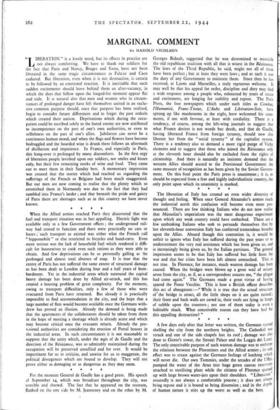MARGINAL COMMENT
by HAROLD NICOLSON
"LIBERATION" is a lovely word, but its effects in practice are not always comforting. We have to thank our soldiers for the fact that Paris and Nancy, Bruges and Siena, have not been liberated in the same tragic circumstances as Falaise and Caen endured. But liberation, even when it is not destructive, is certain to be followed by an emotional reaction. It is inevitable that such sudden excitements should leave behind them an after-vacancy, in which the days that follow upon the longed-for moment appear flat and stale. It is natural also that men and women who in circum- stances of prolonged danger have felt themselves united in an exclu- sive common purpose should, once that purpose has been realised, begin to consider future differences and to forget the past ordeals which created their unison. Deprivations which during the occu- pation could be ascribed solely to the hated enemy are now attributed to incompetence on the part of one's own authorities, or even to selfishness on the part of one's allies. Jubilation can never be a continuous huthan mood, and when the flags and flowers have become bedraggled and the hoarded wine is drunk there follows an aftermath of disillusion and impatience. In France, and especially in Paris, this hang-over is prolonged by many discomforts. In the first orgy of liberation people lavished upon our soldiers, not smiles and kisses only, but their few remaining stocks of wine and food. They came out to meet them in their Sunday best. A momentary impression was created that the stories which had reached us regarding the sufferings of the French or Belgians had been much exaggerated. But our men are now coming to realise that the plenty which so astonished them in Normandy was due to the fact that they had tumbled into France's larder ; and that beneath the pride and gaiety of Paris there are shortages such as in this country we have never known.


























 Previous page
Previous page